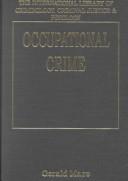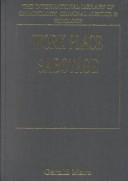| Listing 1 - 10 of 161 | << page >> |
Sort by
|

ISBN: 1855213826 Year: 2001 Publisher: Aldershot Ashgate
Abstract | Keywords | Export | Availability | Bookmark
 Loading...
Loading...Choose an application
- Reference Manager
- EndNote
- RefWorks (Direct export to RefWorks)
Criminology. Victimology --- Corporations --- Employee crimes. --- White collar crimes. --- Corrupt practices. --- Employee crimes --- White collar crimes --- Occupational crimes --- Crimes, Employee --- Workplace crimes --- Corporate bribery --- Corporate corruption --- Corporate crime --- Corrupt practices --- Crime --- Business ethics --- Commercial crimes

ISBN: 1840147881 Year: 2001 Publisher: Aldershot ; Brookfield, VT : Ashgate,
Abstract | Keywords | Export | Availability | Bookmark
 Loading...
Loading...Choose an application
- Reference Manager
- EndNote
- RefWorks (Direct export to RefWorks)
Sabotage in the workplace --- Sabotage en milieu de travail --- Machine breaking (Labor disputes) --- Sabotage of industrial machinery --- Work environment --- Sabotage in the workplace. --- Criminalite des employes --- Criminologie de l'entreprise --- Criminologie economique --- Sabotage industriel
Book
ISBN: 1855215284 1855213796 Year: 1999 Publisher: Aldershot Ashgate
Abstract | Keywords | Export | Availability | Bookmark
 Loading...
Loading...Choose an application
- Reference Manager
- EndNote
- RefWorks (Direct export to RefWorks)
White collar crimes --- #SBIB:316.334.2A80 --- #SBIB:35H2102 --- #SBIB:343.9H0 --- #SBIB:IO --- Occupational crimes --- Crime --- Bijzondere arbeidsproblemen: algemeen --- Personeelsmanagement bij de overheid: specifieke aspecten --- Criminologie --- Business anthropology. --- Commercial crimes. --- White collar crimes. --- Business anthropology --- Commercial crimes --- Business --- Corporate anthropology --- Industrial anthropology --- Management anthropology --- Private sector anthropology --- Public sector anthropology --- Corporate crime --- Crimes, Financial --- Financial crimes --- Offenses affecting the public trade --- Anthropological aspects --- Anthropology --- Corporate culture
Book
ISBN: 9781443883924 1443883921 9781443876926 1443876925 Year: 2015 Publisher: Newcastle upon Tyne, England : Cambridge Scholars Publishing,
Abstract | Keywords | Export | Availability | Bookmark
 Loading...
Loading...Choose an application
- Reference Manager
- EndNote
- RefWorks (Direct export to RefWorks)
Mars' graphic and often vivid narrative can be read simply as the anecdotal memoirs of an anthropologist. The experiences he recounts are sometimes hilarious, touch occasionally on the dangerous, and are always sensitively and expertly explored. But for those who want to know more, the book's expansive footnotes and references to key sources also offer a stimulating introduction to social anthropology, its theories and its methods. Mars begins by describing his childhood life in a tightly structured working class community during World War Two. He then contrasts this with an account of the
Book
ISBN: 3030755452 3030755444 Year: 2021 Publisher: Cham : Springer International Publishing : Imprint: Palgrave Macmillan,
Abstract | Keywords | Export | Availability | Bookmark
 Loading...
Loading...Choose an application
- Reference Manager
- EndNote
- RefWorks (Direct export to RefWorks)
"This book examines how a group of transnational British-Italian women affiliated with the exiled patriots of the Italian Left repurposed traditionally feminine activities, such as fundraising, gift-giving, maternity, and memory collection, to make a substantial contribution to Italian Unification and state-building. Through their actions, Mary Chambers, Sara Nathan, Giorgina Saffi, Julia Salis Schwabe, and Jessie White Mario transcended the boundaries of acceptable behavior for middle-class women and participated in the broader female emancipation movement. By drawing attention to their activities, this book reveals how nineteenth-century female activists achieved their most revolutionary goals by using conservative, domestic, or anti-Catholic language. Adding to the growing understanding of the Italian Risorgimento as a transnational phenomenon, it also shows how non-Catholic and non-Italian women participated in the creation and development of the Italian state. Finally, the book argues for the continuing importance of religion in both politics and philanthropy throughout the nineteenth century." Diana Moore is Adjunct Assistant Professor of History at John Jay College of Criminal Justice, CUNY, USA.
Women --- Social conditions --- Human females --- Wimmin --- Woman --- Womon --- Womyn --- Females --- Human beings --- Femininity --- Italy --- Great Britain --- World history. --- History of Italy. --- History of Britain and Ireland. --- Women's History / History of Gender. --- World History, Global and Transnational History. --- Universal history --- History --- Feminism --- Manners and customs --- History.
Book
ISBN: 0043011667 9780043011669 Year: 1983 Publisher: London: Unwin,
Abstract | Keywords | Export | Availability | Bookmark
 Loading...
Loading...Choose an application
- Reference Manager
- EndNote
- RefWorks (Direct export to RefWorks)
Book
Year: 2021 Publisher: Project Gutenberg
Abstract | Keywords | Export | Availability | Bookmark
 Loading...
Loading...Choose an application
- Reference Manager
- EndNote
- RefWorks (Direct export to RefWorks)
Book
Year: 1977 Publisher: Brighton IDS
Abstract | Keywords | Export | Availability | Bookmark
 Loading...
Loading...Choose an application
- Reference Manager
- EndNote
- RefWorks (Direct export to RefWorks)
Book
Year: 2021 Publisher: Project Gutenberg
Abstract | Keywords | Export | Availability | Bookmark
Book
ISBN: 1409427897 1409471489 9781409427896 9781409471486 Year: 2013 Publisher: Farnham, Surrey : Ashgate
Abstract | Keywords | Export | Availability | Bookmark
 Loading...
Loading...Choose an application
- Reference Manager
- EndNote
- RefWorks (Direct export to RefWorks)
Criminal behavior --- Criminal psychology --- Organized crime
| Listing 1 - 10 of 161 | << page >> |
Sort by
|

 Search
Search Feedback
Feedback About UniCat
About UniCat  Help
Help News
News